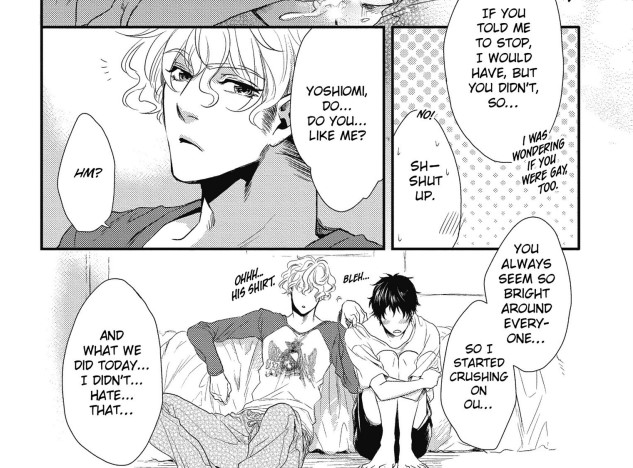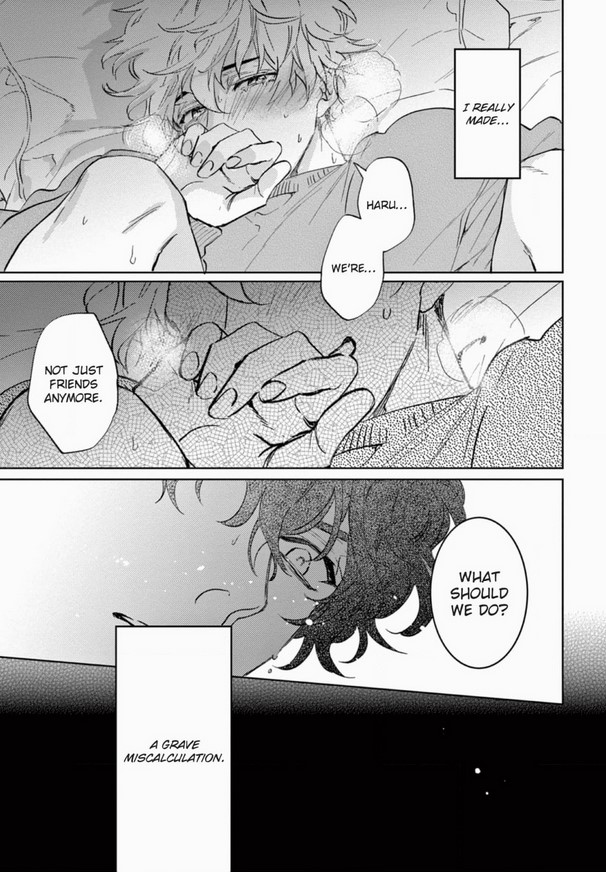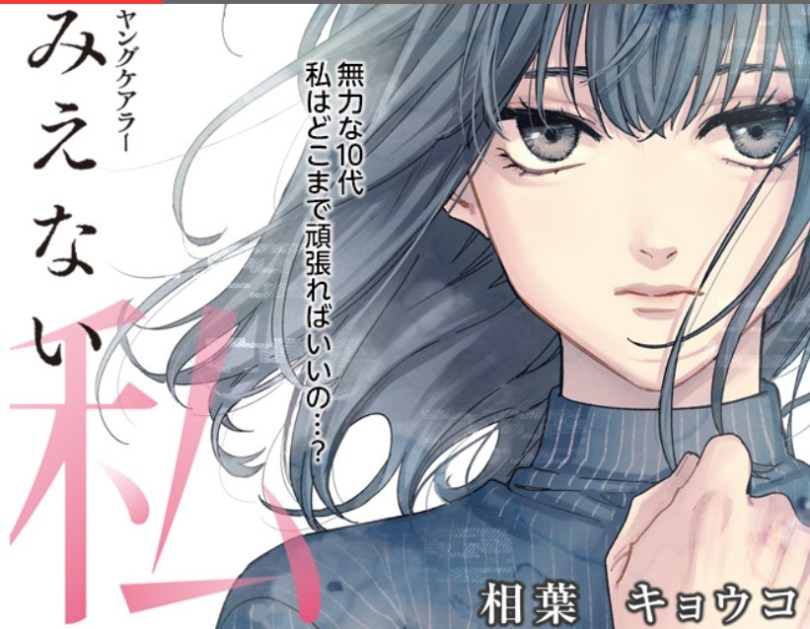Content Warning: dubious consent/coercion, sexual assault
Note: This interview was planned to be read as a companion to this one, conducted by a fellow staff member.
Aiba Kyoko is a veteran of BL manga, with work in the category going back to 2009. During the first years of her career, Aiba published many one-volume titles, shorts, and submissions to anthologies. While a majority of her work was in adult-rated BL, she also dabbled in josei erotica as well as a few non-erotic comedy stories in a variety of demographics; the trajectory of her career is as fascinating as it is varied. And all of this is extremely difficult to trace for an English-language reader, as the scattershot and poorly advertised licensing of Aiba’s work epitomizes the pitfalls of the modern digital manga landscape.
Juné, the longest-running and most prominent imprint for BL in English (from 2004), has only one of Aiba’s works: a digital-only copy of the anthology volume I Love You Enough to Tie You Up (credited in the tagging system to a “Aiba Kyoto”). Dedicated detectives might find one of Aiba’s steamy josei one-shots, “Harlem Knights,” on the coin-based service Renta. And most recently, subscription site Manga Planet licensed Aiba’s 2020 short series Derail.
It is a tragically scattershot offering across the artist’s body of work. Juné has shown an impressive ability to roll with the times, managing to survive the manga bubble burst in 2008 despite serving a niche market and persistently offering DRM-free PDFs for purchase; they have also chosen a singularly terrible introduction to Aiba’s work. Tie You Up is a perfect snapshot of its 2012 release date, deliberately calibrated to what was popular in that moment; even Aiba herself, in an afterword, voices some embarrassment while assessing her earliest work. For an unfamiliar reader, it’s not the best introduction.
That’s a shame, because Aiba’s work deserves attention; as with all artists, she has grown stronger as a writer and discovered the themes that most interest her since those early short stories. Her later 2010s works often feature lovers-for-hire and other relationships that begin as negotiated transactions, complicating and playing with the fairly strict structures that were expected of the kind of story she was writing in her early days to compelling effect. Derail masters this approach, beginning with the concept of a conniving aggressor who manipulates the oblivious object of his affections into sex and then turning the assumptions of that premise on their head. It’s tightly written and unexpectedly gentle.
Aiba herself has taken on new subject matter: her most recent work is Invisible Me, a slice-of-life series about a teenage girl caring for her terminally ill mother. We were able to sit down with Aiba for a gregarious and sadly brief conversation to discuss writing relationship dynamics, greater awareness of LGBTQ+ issues, and her latest work.
The following transcript has been edited for clarity. Thank you to Chiaki for doing a translation of the recorded transcript in addition to Otakon’s provided translator. All questions were provided for approval ahead of the interview.

Anime Feminist: You’ve been a BL author for a long time now, obviously. Particularly in your early work, your stories feature a lot of very aggressive, forceful love interests. What drew you to tell those kinds of stories? Was it a personal interest or sort of what was in demand in the industry? Or something else?
Translator: 初期の作品ですと「押しが強い恋愛関係」といいますか、そういったストーリーがございますが、こういったストーリーは何がきっかけだったのでしょうか?それは個人的に好きなジャンルだったのでしょうか、それとも当時求められていたものだったからでしょうか?
Aiba Kyoko: 相葉キョウコ: 当時求められていたものですね。私もともとBLにそこまで詳しくなかったので、その時点で売っていた物をいっぱい買って勉強して、「あ、こういうものが今の日本のはやりなんだ」と言うものをその時はアウトプットしていました。
Chiaki Translation: It was what was popular at the time. I didn’t know a whole lot about BL at the time, so I bought a lot of titles and studied them to conclude: ‘ah, this is what’s popular in Japan right now,’ and produced work in that vein.
Translator: So it’s definitely the latter, something that the market wanted. And at first I wasn’t too educated on BL, but I started off with buying lots of things on the market and I learned about what I saw there and I wrote something that the market wanted. So that’s how I began.
AF: How do you change the focus or what you emphasize when you’re working on erotica for a BL audience versus a josei audience?

Translator: ジャンルとしてBLと女性向けと言いますか、その間でどのようにエロスが占める位置と言いますか、それはどう変えるのでしょうか?
Chiaki Translation: Between the genres of BL and Josei, is there a key point of difference in the eroticism? How do you differentiate them?
Aiba: BLとそうじゃない漫画?
Chiaki translation: Between BL and other comics?
Translator: そうですね。
Chiaki Translation: Yes.
Aiba: ええと、ボーイズラブは日本の独特の文化っといえば文化だと思うんですけども、男同士の葛藤と言うのが昔からのテーマで、今このLGBTの時代なので、それも難しくなってきているんですけど、まあ本当に昔から続いている日本の文化としては、彼も男で、彼は男が好きか女が好きか分からないから自分が彼を好きになったところで「Yes」って言ってもらえないのではないかって言う葛藤を描くのがボーイズラブかなと思っていて。
で、男女の者は基本言っても大丈夫だろう、性別で受け入れられないって言うことはないだろう、という前提で描いていましたが、最近はやはりちょっとその世間の流れ的にもそうもいかなくなっているというか、まあ難しいところだなとは感じています。
Chiaki translation: Well, I think ‘boys love’ is a distinct kind of Japanese culture in a way. It’s always focused on the conflict between two men as a theme, but in this current LGBT era, it’s gotten more complicated than in the past. Japanese ‘boys love’ culture would take a man who falls in love with another man, but he isn’t sure if the other man is into men or women, so there is some uncertainty over whether confessing his love would work out or not.
However, in a heteromantic story, that’s a non-issue. It’s presumed that gender won’t be an issue on whether a couple would work or not, but that’s not necessarily the case today. I feel it’s something that requires more thought now.

Translator: I believe BL is a very unique genre, where it depicts the thought process going on within the guy of having difficulties and projecting their thoughts–Whether or not their thoughts will get acceptance. However, I believe that things are different now with more movements towards acceptance of the LGBT community and everything. So I believe that expressing the thought is something kind of unique to the BL manga genre. But things like that is probably a bit different now, I think.
AF: Yeah. I wanted to ask: we’ve seen a lot of more sort of grounded or realistic LGBT stories in manga recently. What effect have you seen that have on BL or on your own work?
Translator: そちらLGBT関係の話題で思い出したのですが、性的マイノリティーについての現実的な漫画が増えているという印象なのですが、このような作品が増えることで、相葉さんの作品にどういった影響があるでしょうか
Aiba: 現実的なものって言うのは
Chiaki translation: What do you mean by realistic?
Translator: 現実のLGBT関係と言いますか、状況に目指していると言いますか、よりファンタジックな要素からちょっと遠いと言いますか?
Chiaki translation: How should I put it, trying to depict LGBT relationship in a more real way, like stepping away from a more fantastic take on it.
Aiba: そうですね、昔は本当にさっき言ったような「あの人は男だから女性が好きだろう」と言う前提だった物と言うのが、もうこれしかないぐらいな作りだったんですが、そうではなくなってきたので、最初の葛藤みたいなものがもうないという状態のBLマンガがすごい増えたかなとは思います。で私もやはり…そこをちょっと今のこの時代に合わせて書くのが私はちょっと難しいと感じているので、もともと付き合っていた人の未来の話だったりとか、もう付き合っているところからスタートしたりとかに今私はシフトしています。
Chiaki translation: As I was saying earlier, there used to be so many stories that just assumed “that is a man, so he must like women,” like it’s all you could find out there. But that’s not so much the case anymore and there are now a lot more BL manga that do not have that central conflict anymore. For me, … I think it’s a little difficult to write under those themes now too, so I’m now shifting my focus to stories about the future of couples who were already dating or on couples who start the story off already together.
Translator: I mentioned just now that BL is a very unique genre, where it’s about the thought processes and everything. But I think that the expectations are changing, because before the expectation was that a boy would go out with a girl and that’s that was the norm; but then I think that that difficulty and thought process, the expectation is something that’s a bit different now [or] that might not exist in general right now. So writing for the new era is probably a bit more difficult than what it used to be. Do what I’m moving into is more about the future of existing couples or starting off where the two are already in a relationship. And I try to see how things might develop from there into the future.

AF: I really enjoyed reading Derail a lot, and it really felt in some ways like a commentary on or look back at a lot of your other work. It’s about, you know, these two people who both think they’re manipulating each other even though they both like each other. Do you feel that’s sort of an expression of thinking about how you’ve grown as an artist? And what brings a lot of your stories back to talking about these themes of transactional love, or love for hire?
Translator: 「ディレイル」は特に好きな漫画で、相葉さんの昔の作品へのコメントで読むように感じるところがございます。「ディレイル」は特にお互いのキャラクターが主導権を持っていると思いあうというような過去の作品を突き詰めたという印象を受けますが、お互いの関係が「交換条件」と言いますか-?
Chiaki translation: I particularly liked Derail, it felt like it was a commentary on your older works at parts. Derail seemed to have characters who both felt they were in the driver’s seat and harkens back to your previous works as they — how should I say it, try to establish their balance between them?
Aiba: 駆け引きみたいな?
Chiaki translation: Do you mean negotiating?
Translator: そうですね、駆け引きみたいなロマンスの作品は-
Chiaki translation: Yes, a romance story about negotiating-
Translator: なぜ交換条件的なテーマに戻ってくるのかっという事を気になっております。
Chiaki translation: I wanted to know why you go back to these transactional themes.

Aiba: 今まで迷って迷って告白してみたらオッケーだったと言う話の流れが多かったんですけれども、本来相手に告白して大丈夫かどうかと言うのはもうたぶん全人類が思っている問題で、まあ恋愛において、でその交換条件を付けることで無理やりそのオッケーを引き出すみたいな小ズルイ人間関係みたいなものをちょっと描いてみようかなと思ったからですかね。
まあ、恋愛に対してズルイ、せこい手を使ってでも手に入れたいという愛情の裏返しみたいな。
Chiaki translation: Up till now a lot of stories were about all the fretting over whether to confess or not and finding out at the end that it works out, but wondering whether asking someone out will work out or not is now something everyone worries about when it comes to romance. So I wanted to create a story where a character uses some cunning to bait out the confession using the transactional elements.
So I wanted to take that concept of how people use shrewd or unfair tactics to seduce people and turn it on its head.
Translator: So I believe that there are many things that have the themes of the thought process and then the confession, and then it works out and everything, that kind of thing. However, I believe that by having a transactional element in the relationship, I believe that… the transactional element kind of brings up something aside from getting that confession and going with it, but something a bit more tricky. And I believe that it kind of brings out the idea of doing something that might be a bit more tricky. But then all in the name of love.
AF: Since you started out writing things that were what the market wanted, was there a point you remember in your career that you first thought, “this is a story I passionately want to tell?”
Translator: 最初の質問でいわゆる市場に出回ってるマンガとマーケットが求めていた物を描いたと申し上げていましたが、その時期に「これは絶対自分が世界に発信したいもの」、自分から発信したいものと思う作品はございますでしょうか。
Chiaki translation: As you noted during the first question, you drew manga that was similar to what was already on the market, but did you ever feel a title was “something I want to put out into the world,” or something you wanted to publish?

Aiba: その時には本当に知らない人しかいなくて、ボーイズラブを読んだことが無かったんですね。で急にボーイズラブをやらないかと言う話になったので、知らなかったのです。
知らない人の作品を本屋さんに行って全部買ってきて、置いてあった物を。で、ばぁっと読んだんですけれども、これがとても良いっていうのが分からなかったんですよ、判断がつかなくて。ただその時に、その男同士の葛藤がテーマだなと言うのが分かったので、じゃあこれを描けばいいんだっというのがスタートでした。
Chiaki translation: At the time I really didn’t know anyone, and I have never read boys love before that. I was asked if I’d work on a story out of the blue, so I had no idea.
So I went to the bookstore and bought a bunch of titles by authors I never knew, everything that was there. And I read them all, but I couldn’t really tell you which title was better than another. It’s just that, while I was reading, I came to understand that theme of conflict between two men. And I learned to work from there.
Translator: So, it began with market research. But back then I didn’t know anyone in the market. And when someone told me, “do you want to do a BL manga,” I didn’t really have a taste myself, because I didn’t really know what was good. But I did general research. So in that sense, the themes that I picked up on, basically difficulties and the thought process that the characters had, was one of the themes that I picked up in that research.

AF: There’s a big gap between Derail and the new project that you’re working on. What led you to take that time away besides…well, 2020…and what inspired you to tackle this very different subject matter that you’re working with now, about young carers?
Translator: 今の描いている作品が「ヤングケアラー」に関しての作品だと思うんですが「ディレイル」と現在の作品まで3年のギャップがございますが、このギャップは何が原因だったのでしょうか。そしてこの新しい「ヤングケアラー」に関しての、トピックと言いますか、何が筆を動かしたのでしょうか?
Aiba: 実は「ディレイル」の後にも別のボーイズラブの作品を連載していて、「ディレイル」の方があまりにも名前が出てしまったんですけど、別の作品が実はありました。そしてそれが終わってから、まあ半年ぐらいの期間を開けて、「ヤングケアラー」を描き始めたんですが、「ヤングケアラー」の話に関しては、私が実はヤングケアラーで、そのエピソードを少しいつか物語にしたいなと思っていたので、まあヤングケアラーと言うテーマに関して自分も詳しかったので、じゃあこれをちょっとそろそろ取り扱ってみようと思いました。
Chiaki translation: I’ve actually had a separate boys love story serialized after Derail. It’s just that Derail is so much more well known, but I did release a separate work after that. And after I wrapped that series up, I started working on Young Carer about six months after that. But the story of Young Carer is something I wanted to write about being a young carer myself. Since I was intimately familiar with young carers, I felt it was time to take that story on.
Translator: Actually after Derail, I did several other BL manga. I believe that they might have gotten overshadowed by Derail, but then there was a gap of half a year. That was the time where I said I would like to tackle the topic of young carers because I myself was a young carer, so I believe that I will be able to tell my story [about] young carers. It was something that I had that I had experienced myself too.
Editor’s Note: It was a real heartbreak to be cut off for time by Otakon staff at this point before we could discuss Invisible Me more; its serialization is currently ongoing, and we hope for its success and eventual release in English.
9/14/23: This article was edited after publication to clarify interview procedure, and some intro text was altered; while the tone may have been intended as affectionate tongue-in-cheek, its actual effect conveyed disrespectful condescension and dismissiveness toward BL as a genre and to Aiba Kyoko herself, an artist whom we greatly respect. We deeply regret this error.






Comments are open! Please read our comments policy before joining the conversation and contact us if you have any problems.